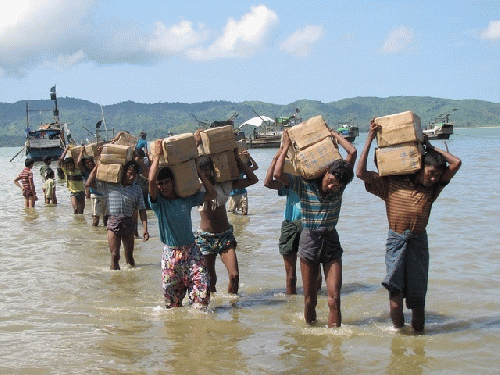From Smirking Chimp

Rohingya groups in Myanmar and Bangladesh live in extremely difficult climate conditions.
(Image by Image credit: European Commission DG Echo) Details DMCA
In recent years both the US and Europe have faced what seems a never-ending flood of refugees; the US from Mexico and Latin America and Europe from north Africa and the Middle East. The affected countries trying to absorb this flood of refugees considered this uncontrolled influx something approaching national emergencies. What to do with all these people? Where to house them? How to feed them? How to contain the inevitable backlash from their own citizens and the resulting growth in right-wing nationalism.
While solutions to those problems remain largely unsolved, a bigger problem looms just over the horizon; mass migration of climate refugees. This surge of climate refugees will dwarf current immigration problems. While today the US and southern Europe face a flood of refugees, most from dysfunctional countries or regional wars, the climate refugee problem will be a tsunami in comparison.
Enormous bodies of refugees, not numbering in the millions, or the tens of millions, but in the hundreds of millions, will flee areas of the world where changing climate ravages already marginal agriculture, whether through too much rain, too little rain, rising temperatures or rising sea levels.
Recently I spent a week reading research papers by scientists, world health organizations and world bankers on this very subject. The bottom line: "we ain't seen nothing yet."
"We are now witnessing the highest levels of movement on record. About 258 million people, or one in every 30, were living outside their country of birth in 2017. That is both a record high -- there were 173 million in 2000 and an alarmingly volatile figure: a 2003 projection anticipated that by 2050, there would be up to 230 million international migrants. The latest revised projection is that there will be 405 million international migrants by 2050.
While regional wars and poor governance have fueled most of our current migrations, climate-fueled migrations are just now beginning to ramp up.
"In 2015, over a billion people migrated: 244 million went abroad and 763 million moved within their home country. The numbers of migrants are growing. From 2000 to 2015 annual migration growth was 2.4%. This was double the annual population growth of 1.2%.
The countries of origin for the coming climate-change refugee flows will be from many of the usual suspects, researchers predict.
"Climate change will transform more than 143 million people into "climate migrants" escaping crop failure, water scarcity, and sea-level rise, a new World Bank report concludes. Most of this population shift will take place in Sub-Saharan Africa, South Asia, and Latin America.
And, from the National Academy of Sciences:
"This suggests that crop yield -- induced migration will be a significant issue in many areas of the world that are expected to experience a substantial reduction in yields as a result of climate change, including much of Africa, India, Bangladesh, Latin America, and Australia, among others... our findings are significant -- from a global perspective given that many regions, especially developing countries, are expected to experience significant declines in agricultural yields as a result of projected warming."
Researchers at the University of California, San Diego, dug deeper, outlining the causes and effects of predicted climate change on mass population movements:
"First, environmental problems may directly lead to emigration. Secondly, environmental stress may lead to resource conflicts, and these conflicts may produce refugees. Each type of migration may lead to conflict in receiving areas; however, they may not be equal in their effects global climate change has the potential to directly uproot people from their home communities. Research on this topic suggests several possible mechanisms through which people may be forced out of their current habitat:
"Sea-level rise caused by a reduction in glacial coverage will lead to the flooding of coastal areas.
(Note: You can view every article as one long page if you sign up as an Advocate Member, or higher).





